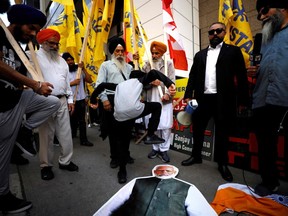Canada's Khalistani Movement
"The atmosphere in the Sikh community of the 1980s was rife with militancy where groups of militants, including the Sant Bhinderwale followers, as well as police created an atmosphere of fear and distrust among many of the ruling residents.""[Ram said he felt he had] no choice [but to provide food and shelter to the armed militants who appeared at his farm].""I do not find that Mr. Ram's actions amounted to providing a 'safe house' or 'logistical support' as the [government] has framed it in their submissions.""He listened to the speeches when they came to the farm and came to support their ideas, including a separate Khalistan state in India, however he never became a member of that organization nor did he donate money or carry out any activities in support of this group."Heidi Worsfold, Immigration and Refugee Board tribunal member ruling
 |
IRB's Heidi Worsfold ruled that the federal government had no reasonable grounds to declare Indian citizen Kamaljit Ram inadmissible to enter Canada based on the belief that he had provided a "safe house" and "logistical support" to Khalistani militants whose purpose was to overthrow the government of India. On the government's part, the man is said to have "housed and fed" armed Khalistani militants in India over a period of ten years. Ms. Worsfold disagreed, ruling he should be permitted into Canada because his actions stemmed "mostly out of necessity and fear of retribution".
Kamaljit Ram informed Canada Border Services Agency officers in an interview that he had sheltered and fed armed Sikh militants at his farm in India in an on-and-off basis in the years 1982 to 1992. He informed the officers that he supported the ideology that followers of Jarnail Singh Bhindranwale espoused. And "other social issues" expressed by the Sikh militant, a leading figure of the Khalistani movement for a separate Khalistan state for Sikhs.
As such that admission alone should disqualify the man to enter Canada under Canadian immigration law, prohibiting individuals who engaged in or instigated the "subversion by force of any government", pointed out CBSA. Still, it was Ms. Worsfold's opinion that government exceeded itself in its assessment of Mr. Ram's support for the armed militants; omitting to consider that he repeatedly claimed he hosted the armed individuals "in fear" of the "consequences" should he appear to be be on the wrong side of the group.
While agreeing with the CBSA that Mr. Ram was obviously sympathetic to the idea of a separate Khalistan State for Sikhs, the adjudicator emphasized that the man's support for the cause appeared to fizzle out before the armed rebellion of 1984 took place, along with the established fact that he had never become a member of the armed militias. The ruling noted that although Mr. Ram's statements included inconsistencies, his justifications for them "somewhat unreasonable", yet she also ruled:
"However, it does not change my finding that Mr. Ram's provision of food and shelter was mostly out of necessity and within the context of the political situation in Punjab, India", she wrote.
The ruling is unfortunate, given that it arrives at a time of tense relations between Canada and India, mere weeks following Prime Minister Justin Trudeau's statement in the House of Commons that there were "credible allegations" linking the government of India to the assassination of a British Columbia Sikh Canadian back in June. For its part, while calling the allegations "absurd", the Indian government repeated that Canada does nothing to address the Sikh separation movement that has established itself in Canada that led to the worst terrorist event Canada ever experienced.
 |
| Protesters rally outside the Indian High Commission in Ottawa. (Sean Kilpatrick/The Canadian Press) |
Labels: Canada, Khalistani Militants, Subversion of India

<< Home